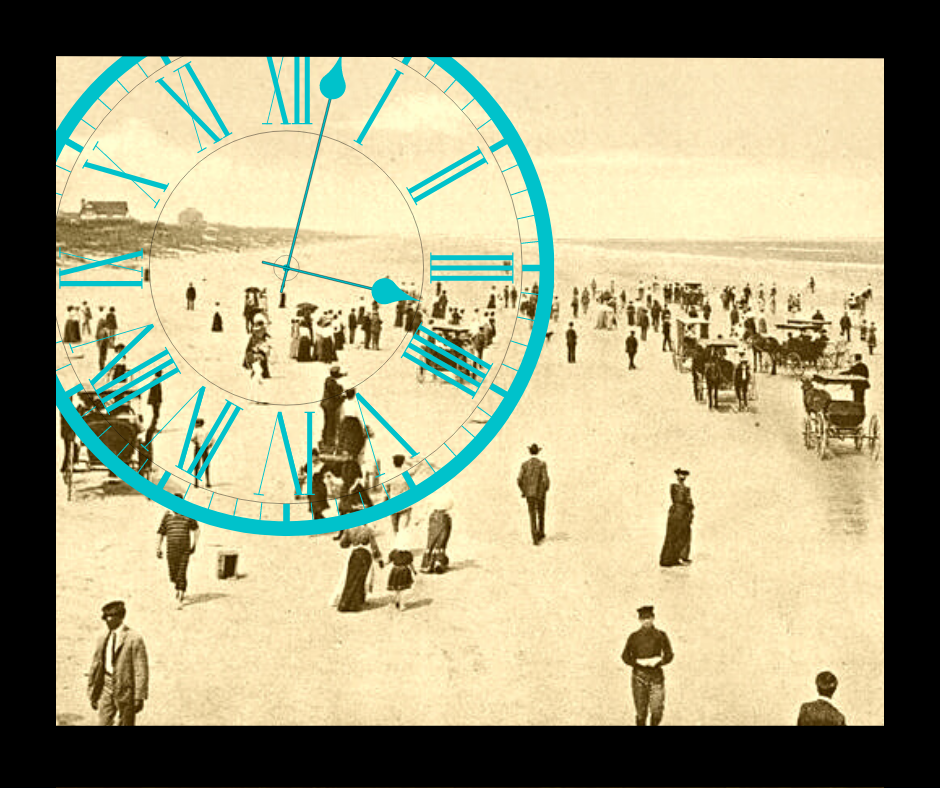Neat Stuff I Learned Painting Brass Era Cars
Oh, the Brass Era cars! Not only were they mechanical wonders, but they looked like a million bucks! For the roughly 20 year period from 1896-1915, these horseless carriages turned heads and caught the sunlight in a way we rarely see today. Their flashy trimmings included trumpety horns, lampy lanterns, and a dashboard full of golden gauges and levers. As one who is often attracted to shiny things, I couldn’t resist the nudge to paint them.
Racing on the Beach
When the idea struck to make these paintings, I was rummaging through history — scrolling through articles about the early days of my city. And when I hit the beach area, I found fabulous old photos of cars parked alongside the surf. Pity they were in black and white because I bet it was a sight to see in color. I just loved imagining what it looked and felt like back then.
Reading into it, I learned that north Florida was very popular for driving on the beach, especially Jacksonville and Daytona. Automobiles were still quite new to the planet, but for those who had them, this was a favorite pastime. When the tide was out, the sand was very hard and flat, making a pavement superior to dirt and mud. So, no surprise, speed enthusiasts got word — and in a blink of an eye, and with the wave of a checkered flag — the north Florida coastline became the racing capitol of America. Aha! I get it now — this is how Daytona became Daytona!
The cars I painted weren’t racecars, but I suppose they could’ve been with the right lead-footed chap. What stuck in my mind though, was the idea of ‘favorite pastime’ — driving with the top down on a sunny day, feeling the ocean spray, umbrellas and racquets peeking out partway. I wanted to go back in time to see it. And what’s the coolest way to time travel? In my humble opinion — paint!
The first car I chose was a Studebaker. Why? Maybe because I like saying the word. Studebaker. Stu-de-baker. Sounds so studious and smarty-pants. Also, the logo is pretty. It’s all angled and flourishy. Let’s try that with tiny brushes! Yeah, anything to cause struggle and slow-down. Sheesh! What was I thinking? Next time I paint a 10 letter word, I hope it’s larger than an inch and a half.
Electric? Way Back Then?
While learning about Studebaker, I came across a neat surprise. You may already know this, but it was a zinger to me. They made electric cars! Way back in 1902 and on into 1912. They weren’t the first company to offer them, but one of the first to make them popular, and this was over 100 years ago! Well, I stand flabbergasted! I thought the EV’s started with Tesla. Apparently, most early electrics were exceptional machines and well loved, but gas-powered cars were — wait for it — cheaper and more convenient. So, the quick production of cars like the Ford Model T allowed for one industry to prevail, and the other to fade away. Sigh. Sounds all too familiar.
As an artist who loves to envision impossible things, and sometimes takes longer to get my RPM’s up. I can’t help but wonder, what if things would’ve evolved differently? What if electric vehicles could’ve had time to become cheaper and more convenient? Could the world have moved forward with half of the cars on the road being gas-powered and the other half electric? How would things be different now?
Well, woulda coulda shoulda, I can’t change the past. But thankfully, with the way things are going, I can hope to own an electric car someday. Knowing me though, it might just be an antique. They’re still out there! You can actually purchase them. Like this one at Classic Auto Mall — wouldn’t it be cool to take to the beach?
Franklin’s Fabulous Fan
And then I saw a 1906 Franklin. The front grill of this car was so different — round, and behind the logo were these large twirling blades. I assumed that, in a steampunk sort of way, this car was exposing normal inner workings while all other cars were hiding them, but I was wrong. This spinning whirligig, like what you would see atop a desk or factory, was not at all ‘normal’ for a car.
Back then (and like now) the cooling system of choice for an engine was a radiator. Water moving through tubes kept a car from overheating. Franklin, on the other hand, used this fabulous fan to pull in air from the outside to keep things cool. Brilliant. Well, sort of. They were fascinating at least. If you’d like to see more of what they looked like. There’s a beautiful one for sale here.
So do we have air-cooling now? On airplanes, yes, but not so much on cars. The reason for this is complicated. And despite what you might think, given the natural nature of air, it has to do with protecting the environment. If you’re curious, CNET offers a more detailed explanation about this. It’s worth learning. The way the modern world effects the air we breathe can sometimes go unnoticed. Not by you of course. I see you with your hybrids and bicycles. So enjoy your pastimes in real time — we’re making progress!
These paintings were a lot of fun to make, and opened my eyes to some pretty neat stuff! They’re currently available in my Etsy shop. Please cruise on by :)










